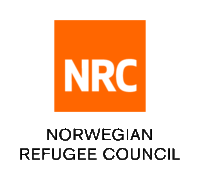Norwegian Refugee Council
 | |
| Motto | “Rights respected and people protected” |
|---|---|
| Founded | 1946 |
| Type | Humanitarian NGO |
| Location | |
| Fields | Refugees, IDPs, Activism, NGO |
Key people | Jan Egeland, Secretary General |
| Website |
www |
The Norwegian Refugee Council (NRC, Norwegian: Flyktninghjelpen) is a humanitarian, non-governmental organisation which promotes and protects the rights of people affected by displacement. This includes refugees and internally displaced persons who are forced to flee their homes as a result of conflict, human rights violations and acute violence, as well as climate change and natural disasters.
NRC is politically independent and has no religious affiliation. NRC is also the only Norwegian organisation that specialises in international efforts to provide assistance, protection and durable solutions for people affected by displacement. NRC’s employs approximately 5000 staff members in 25 countries throughout Africa, Asia, South America and the Middle East. The NRC headquarters is located in Oslo and employs about 170 employees. Additionally the organisation has a presence in Brussels, Geneva, Addis Ababa and Dubai.
NRC was established in 1946 under the name ‘Aid to Europe’, to assist refugees in Europe after World War II. In 1953 the organisation changed to its current name, Norwegian Refugee Council (NRC). Today NRC is organised as an independent, private foundation.
NRC’s primary focus is the provision of humanitarian aid during the emergency stage of a conflict or natural disaster, when needs are often most acute. However, emergency relief alone cannot resolve the underlying drivers of displacement and humanitarian need. It can also create aid dependency. Therefore, NRC pursues a holistic, rights-based approach, which includes emergency relief and early recovery, and which seeks to promote resilience and sustainable solutions to displacement. NRC is committed to the humanitarian principles of humanity, neutrality, independence and impartiality.
Program activities
NRC’s actions are concentrated on six core activities:
Shelter: Emergency shelter, housing, schools and establishment of other forms of public infrastructure.
Food Security: Distribution of food and non-food relief items.
Information, counselling and legal assistance (ICLA): Focus areas as housing, land and property, legal identity, statelessness and refugee status procedures.
Water, sanitation and hygiene: Access to clear drinking water, sanitation and waste management facilities.
Education: Education programs targeted children and youth.
Camp management
Advocacy
NRC advocates towards decision-makers, on local, national, regional and global levels, in order to obtain full respect for the rights of displaced and vulnerable people. Messages and strategies are based on first-hand experience and specialised expertise. Advocating with the United Nations, especially with protection mandated agencies, is a priority in order to strengthen humanitarian response.
Internal Displacement Monitoring Centre (IDMC)
In 1998 NRC established the Internal Displacement Monitoring Centre (IDMC) in Geneva. The IDMC contributes to improving national and international capacities to protect the assist of the millions of people around the globe who have been displaced within their own country. IDMC also develops statistics and analysis on internal displacement, including analysis commissioned for use by the United Nations.
Emergency Roster – NORCAP
NORCAP is a standby roster operated by NRC and is funded by the Norwegian Ministry of Foreign Affairs. NORCAP strengthens the United Nations, international mechanisms and national governments through rapid deployment of experienced personnel. The roster consists of 650 men and women from Norway and countries in Africa, Asia, Middle East and Latin America. Since its establishment in 1991, NORCAP's experts have been on more than 7000 missions worldwide.
Publication
Perspective NRC publishes "Perspective" magazine four times a year. The magazine is the first international foreign affairs magazine published by a Norwegian NGO and focuses on the humanitarian dimensions of international politics. The magazine is in sale in more than 15 countries.
The Nansen Refugee Award
The Nansen Refugee Award is an international award that is yearly given by the UN High Commissioner for Refugees (UNHCR) to a person or group for outstanding work on behalf of the forcibly displaced. Since 2009 NRC has been working with the UNCHR for organising and carrying out the ceremony. The award consists of a commemorative medal and a US $100,000 monetary prize donated by the governments of Norway and Switzerland.
Previous winners:
2012: Hawa Aden Mohamed – for her social activism in Somalia.
2011: Society for Humanitarian Solidarity (SHS) from Yemen – for their humanitarian work in Yemen.
2010: Alixandra Fazzina, photojournalist – for her dedication to documenting and publicising the consequences of war.
Secretary General
Jan Egeland took up the position as Secretary General in August 2013, replacing Elisabeth Rasmusson who was appointed to the position of Assistant Executive Director of the World Food Programme (WFP).
Secretary Generals in NRC:
Jan Egeland 2013–
Elisabeth Rasmusson 2008–2013
Thomas Colin Archer 2006–2008
Raymond Johansen 2002–2005
Steinar Sørlie 2000–2002
Ola Metliaas 1997–1999
Gunnar F. Andersen 1994–1995
Trygve G. Nordby 1990–1994, 1995–1997
Eva Dunlop 1981–1990
Ruth Ryste 1980
Wilhelm S. Bøe 1960–1980
Arne Fjellbu 1956–1960
Knut Okkehaug 1953–1956
References
External links
- Official website (English version)
- Internal Displacement Monitoring Centre (IDMC)
- NORCAP
- UNHCR
- United Nations
- The Nansen Refugee Award